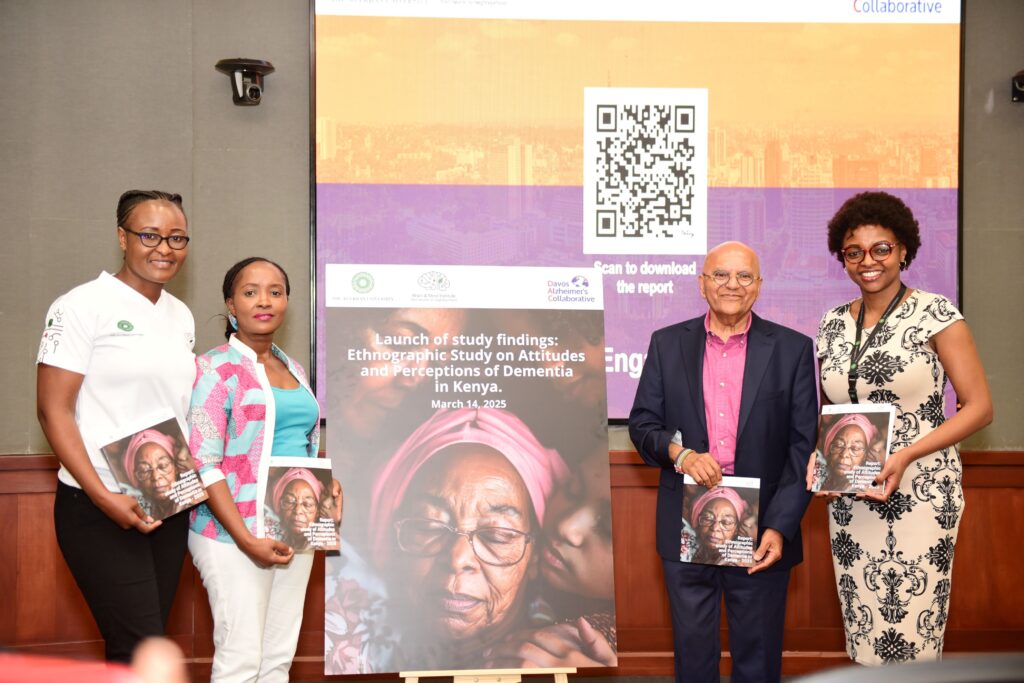
Brain and Mind Institute (BMI) Medical Anthropologist, Dr. Edna Bosire, Ministry of Health Director, Mental Health Division Dr. Mercy Karanja, BMI Founding Director, Prof. Zul Merali, and Aga Khan University Hospital Consultant Neurologist and Head of Section, Neurology Services Dr. Sylvia Mbugua at Aga Khan University Hospital officially launch the Dementia study findings at a forum held at Aga Khan University Centre.
Dementia is rapidly emerging as one of Kenya’s most pressing health challenges, yet it remains largely misunderstood, often ignored, and shrouded in stigma.
Thousands of families struggle in silence. When a loved one starts forgetting names, getting lost in familiar places, or struggling to communicate, these symptoms are commonly dismissed as “just old age.” In some cases, cultural beliefs attribute the condition to supernatural forces, delaying much-needed medical intervention.
A study by the Aga Khan University’s Brain and Mind Institute (BMI), in collaboration with the Davos Alzheimer’s Collaborative (DAC) and Aga Khan University Hospital, Nairobi (AKUH, N), sheds light on these challenges. Led by Dr. Edna Bosire, the research explored perceptions of dementia among patients, caregivers, and healthcare providers at AKUH, N, as well as within informal settlements.
READ MORE My Passion For Humanity, Sustainability Birthed Fashion Company
“The findings reveal a troubling reality: stigma, lack of awareness, and misinformation prevent early diagnosis. Caregivers are left to shoulder the burden with little support, and participation in dementia research is hindered by cultural concerns and mistrust,” said Dr. Bosire.
By the time families seek care, the disease has often progressed to an advanced stage.
“Even then, the journey to diagnosis and support is riddled with obstacles. A shortage of trained healthcare professionals, high costs of care, and a lack of awareness leave many families feeling lost and overwhelmed,” added Dr. Bosire.
Making Dementia Care a Priority
Despite the rising number of dementia cases in Kenya, investment in research and care remains limited. Professor Zul Merali, Founding Director of the Brain and Mind Institute, emphasized the urgent need for action.
“We must invest in research, not only to better understand dementia but also to develop solutions that work within our communities. Our goal is to create a system where dementia care is accessible, affordable, and evidence-based,” he said.
ALSO READ Radisson Blu Hotel Nairobi Upper Hill Nominated For Prestigious Award
The healthcare system is struggling to keep pace. Dr. Sylvia Mbugua, Neurologist and Head of Section at Aga Khan University Hospital, Nairobi, highlighted the importance of early diagnosis and training for healthcare providers.
“Dementia steals a person’s sunset years it changes their personality, memory, and independence,” she noted. “The more we understand it as a disease, the better we can care for our loved ones with patience and empathy. Early diagnosis is key, but we also need more trained specialists and national policies that prioritize dementia as a public health issue.”
Integrating dementia care into Kenya’s national health strategy is critical. The Ministry of Health has begun making strides toward this goal, but more work remains.
Dr. Mercy Karanja, Director of the Mental Health Division at the Ministry, underscored the importance of policy-driven solutions.
“We are working to integrate dementia care into Kenya’s broader mental health strategy, training healthcare workers, improving access to diagnosis, and developing community-based support programs. But there is still much to be done to ensure clear policies are in place,” she stated.
While the challenges are undeniable, this study provides a foundation for change. With the right policies, increased awareness, and stronger healthcare investment, Kenya has an opportunity to reshape the future of dementia care ensuring that every person affected by this condition receives the care and support they deserve.
By Mercy Musyoki









Our platform features many types of pharmaceuticals for online purchase.
Users can quickly buy essential medicines with just a few clicks.
Our product list includes both common medications and targeted therapies.
Each item is supplied through reliable suppliers.
We prioritize quality and care, with data protection and on-time dispatch.
Whether you’re filling a prescription, you’ll find what you need here.
Visit the store today and experience stress-free online pharmacy service.